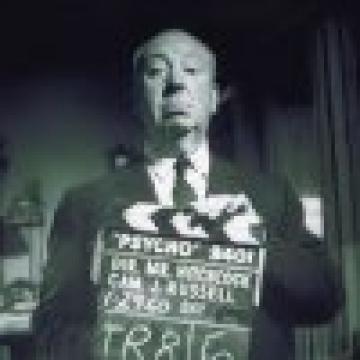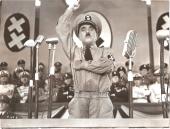Put a Hitch in your getalong with `Hitchcock Across the Pond’ series
Saturday, October 1, 2011
"I have the perfect cure for a sore throat: Cut it.”
---Alfred Hitchcock
If Congress really wanted to do something useful, they'd pass a law making it a misdemeanor to watch any Hitchcock film on TV -- and a felony for "Psycho."
Why schlep to a theater to see ancient movies you may have seen before or perhaps even have in your own video collection? I'm glad you asked: Because (1) they must be seen on a big screen for full visual effect, and (2) they were meant to be watched with that last crucial ingredient in the director's formula -- an audience -- for the collective gasps, laughs and occasional shrieks of the experience.
October is the month to put a Hitch in your getalong to the Regent Square Theater for Pittsburgh Filmmakers' Sunday night series, "Hitchcock: Across the Pond." Before he was lured to Hollywood in 1939, the Master of Suspense had a successful, decade-long directing career in England. Two of those early pictures are particular gems, and two others made later in America seem particularly "British."
All four on hand are worth your time and trip to Braddock Avenue. What else are you doing at 8 p.m. Sunday, anyway, except dreading Monday morning?
"There is no suspense in a bang, only in the anticipation of it," declared the cinema's supreme technician, whose flair for visual storytelling, the moving image and emotional manipulation have never been bettered. His English films were as playful and facetious as the Yankee entries, with trademark moments of dark fear and sexual menace.
The main quartet on tap:
• Oct. 1: "The 39 Steps" (1935, UK): Mistaken identity was a favorite, recurring Hitchcock theme. When a frantic Mata Hari is murdered in his apartment, dashing Robert Donat gets dragged into an international spy-ring plot to steal state secrets. He sets off for Scotland to work on the mystery and on his snappy repartee with cool blonde Madeleine Carroll. Their memorable banter (while handcuffed in bed) set the bickering mode for sophisticated romantic mysteries of the future. "What chance of escape have you got, tied to me?" she asks. "Good question for your husband -- you're the white man's burden," he replies. The adaptation by Alma Reville (Hitchcock's talented wife) includes the deliciously sexy removal of Carroll's stockings, a man with a missing finger and the pivotal character of Mr. Memory (Wylie Watson). The bravura climax in a London music hall is a harbinger of bravura crowded-theater finales to come in "The Man Who Knew Too Much" and "Torn Curtain." (93 minutes)
• Oct. 9: "Spellbound" (1945, USA): Alf Hitchcock meets Sig Freud in this psycho-thriller starring Ingrid Bergman as a psychiatrist trying to unlock the amnesiac mind of Gregory Peck. He showed up as the new head of Green Manors Mental Hospital but turned out to be an impostor and accused murderer, with a pathological aversion to parallel lines. Don't ask. When he flees, Dr. Ingrid -- who has fallen in love with him -- follows. Highlights include the famous dream sequence designed by Salvador Dali, complete with gigantic eyeballs and life-threatening scissors. Plus Freudian slips on the ski slope. Ben Hecht's script has plenty of plot and character flaws, but Miklos Rozsa's haunting score (employing a theremin) won an Oscar. My favorite character is Michael Chekhov as Ingrid's mentor, Dr. Brulov, who says things like, "Good night and sweet dreams -- which we'll analyze at breakfast." And: "Women make the best psychoanalysts until they fall in love. After that they make the best patients." (111 minutes)
• Oct. 16: "The Lady Vanishes" (1938, UK): On a train trip through Europe, Margaret Lockwood wakes up from a nap to discover the sweet old lady (Dame May Whitty) she'd been conversing with has disappeared. None of the other passengers have the slightest recollection of her, and a psychiatrist on the train -- there's always one -- suggests she never existed. Margaret suspects something more sinister in this witty mystery-comedy, co-starring Michael Redgrave. Orson Welles reportedly saw it 11 times. (97 minutes)
• Oct. 23: "The Paradine Case" (1947, USA): Hitchcock called this rarely seen (and sub-par) courtroom drama "a love story embedded in the emotional quicksand of a murder trial." It's the ever-so-talky tale of beautiful Italian Maddalena Paradine (Ann Todd), accused of poisoning her old blind military hero husband. Her case is taken on by barrister Gregory Peck, who falls increasingly under her spell. Look for Ethel Barrymore and Charles Laughton ("I do not like to be interrupted in the middle of an insult!"). Producer David O. Selznick wrote the unwieldy screenplay. Peck and Todd are no Burton and Taylor. It was around this time that Hitch made his famous statement, "Actors are cattle," later revising it to, "I never said actors were cattle. What I said was, actors should be treated like cattle." (114 minutes)
That's it for the Regent Square series. But somebody must have left the windows open because, on Oct. 19, "The Birds" (1963, USA) flies into the Melwood Screening Room. Jet-setter socialite Tippi Hedren stalks Rod Taylor to a sleepy coastal California town, where his and her fine-feathered enemies suddenly go on the attack. This paranoiac morality tale, loose-as-a-goosely based on a Daphne du Maurier story, retains its terrifying potency. You'll never look at birds -- and their beaks of mass destruction -- the same way. Hitchcock uses a sci-fi animal-kingdom apocalypse to reflect the darkest insecurities of his heroine. At least she doesn't take a shower. (120 minutes)
P.S. There's a semi-related special event, Oct. 30, that might be called "Fritz & Freddie": a screening of the German expressionist masterpiece "Metropolis" (1928), directed by Fritz Lang -- Hitchcock's great influence and inspiration. In 1981, composer Giorgio Moroder undertook a three-year project to score the dystopian classic with music by himself and some of that era's biggest stars, including Freddie Mercury, Pat Benatar and Adam Ant. Inter-titles were replaced with subtitles, and sound effects and color were added. The resulting "silent" film experience has been out of circulation for a quarter century -- until now, in crisp new HD digital-transfer form. It rocks. (82 min)






